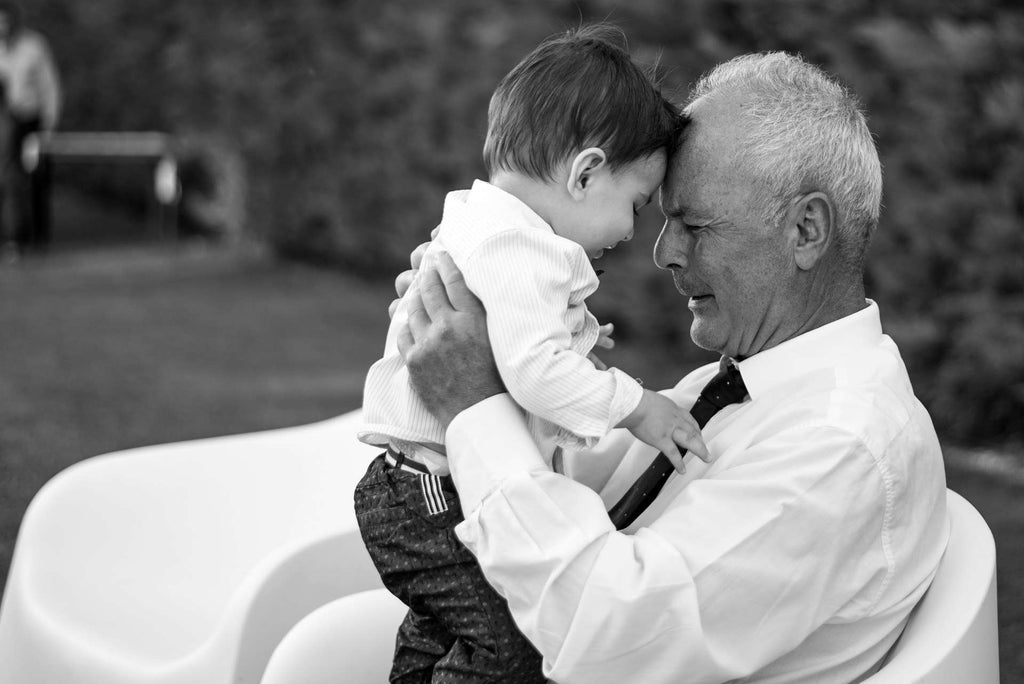 Losing a loved one is an incredibly challenging experience, and as we navigate through the grief, there comes a time when we must honor their life and legacy with an obituary. Crafting an obituary is more than just a formality; it's an opportunity to celebrate and commemorate the individual who has passed away. So if you’re not sure how to write an obituary or what to include in this section of your loved one’s funeral program, here’s a comprehensive guide with an example obituary to help you write a memorable one.
Losing a loved one is an incredibly challenging experience, and as we navigate through the grief, there comes a time when we must honor their life and legacy with an obituary. Crafting an obituary is more than just a formality; it's an opportunity to celebrate and commemorate the individual who has passed away. So if you’re not sure how to write an obituary or what to include in this section of your loved one’s funeral program, here’s a comprehensive guide with an example obituary to help you write a memorable one.
Understanding the Purpose of an Obituary
An obituary is a common way of announcing the death of a loved one, usually online or in a local newspaper, and it typically includes a brief biography plus details of their funeral arrangements. However, its purpose goes beyond mere notification. It's a chance to reflect on the life of the deceased, highlighting their accomplishments, personality traits, and the impact they had on those around them. It's a way to honor their memory and provide closure for friends and family.
In this article, the example obituary will form part of a funeral program that will be given to friends and family at the memorial or celebration of life service. For that reason, details like the location and content of the service can be included on another page of the program.
Step-by-Step Guide on How to Write an Obituary
Gathering Information
It can be hard to know how to start writing an obituary for a loved one, so begin by collecting essential details about the deceased, such as their full name, date and place of birth, date of death, and surviving family members.
Then ask yourself, what are the first words that come to mind when you think of the person. Ask friends and family for help with this by sharing with you some memorable stories about your loved one’s life, including funny or unusual events that highlight their character and what sort of life they lived. You can also include details about significant life events in the obituary, such as education, marriage, children, employment, military service, charity work, religious or political activities and awards.

For more inspiration, consider answering these questions about your loved one:
- What was the one thing you loved most about them?
- What did people often say about their personality?
- What were their proudest achievements?
- What hobbies or interests did they have?
- What special mannerisms or unusual character traits did they have that made them uniquely wonderful?
Deciding on how serious or light-hearted the obituary should be is a personal decision and depends on what you consider to be most appropriate for the person and situation. Use your own judgement but keep in mind how you think your loved one would want to be remembered.
Structuring Your Obituary
Begin with a personal memory or special character trait of your loved one followed by a concise announcement of the death, including the person's name, age, and date of passing. Then, delve into their life story, starting with their early years and progressing chronologically through major milestones. Be sure to include details about their family, education, career, and community involvement. Finally, conclude with information about the funeral or memorial service.
Personalizing with Memories and Achievements
Infuse the obituary with personal anecdotes, memories, and achievements that showcase the unique personality and character of the deceased. Share stories that highlight their passions, quirks, and the ways in which they touched the lives of others. Including meaningful quotes or passages can also add depth and emotion to the obituary.
As well as stories about their life, an obituary for a funeral program can also include the names and relationships of surviving and predeceased family members. For example,
“David was preceded in death by his father, John, and his mother, Sarah. He is survived by his wife Rachel, his four children, Mike, Luke, Alice, and Rebecca, his brother Simon, and several cousins, nephews, and a niece.”

A good way to finish the obituary would be to add a personal prayer, a favourite poem or special phrase your loved one always used to say. Practical details about the memorial service, like where to send flowers or donations, can either be included below the obituary or on a separate page of the program. If you have a long obituary or need more space for extra service information or photos, using a 12-page funeral program template or larger 11x17 inch program is a good idea.
Before printing your funeral program at home or a local print shop, it’s a good idea to check the spelling of all the names you’ve included and ask at least one other person to proofread your obituary for mistakes or missing information.
Our Example Obituary for Inspiration:
Looking for inspiration? Here's an example of a well-crafted obituary that beautifully captures the essence of the individual it honors:
Daniel was a kind and caring man, who gave the best hugs and always had time for people. He would welcome you in, put the kettle on and just sit and listen. You always felt loved after spending time with Daniel.
Daniel passed away peacefully at his home on June 28th, 2021 at the age of 87. He was Born on May 20th, 1934 to Mary & Edward Jones and was Mary’s little ‘Solider’. He was a fun-loving child who enjoyed playing with his best friend and brother John and the two of them were inseparable. Daniel grew up in Minnesota where his parents owned a flour mill and after graduating from UMN he taught math at the local High School. He was a Christian and always went to church on Sundays where he welcomed people at the door with the firmest handshake and the biggest smile.
In 1960 Daniel met and fell in love with Janet and they were married in St. John’s Church. Daniel and Janet had two beautiful daughters Felicity Fields and Kate Andrews. Daniel took pride in his family and was a loving family man, always making time for his wife and girls. Daniel loved the water and won several medals sailing at a professional level. He supported the local football team and was a long serving volunteer at his neighbourhood soup kitchen.
Daniel was preceded in death by his father, Edward, and his mother, Mary and is survived by his wife Janet, his daughters Felicity and Kate, his brother John, several cousins, nephews, and great-grandchildren Lois and Barney. He will be greatly missed but the love he shared will continue to live on in our memories forever and as he often said, "there’s a rainbow to every storm".

Tips for Crafting a Memorable Obituary
- Keep it concise: Focus on the most significant aspects of the person's life.
- Use language that reflects their personality and style.
- Consider the audience: Tailor the tone and content to suit the preferences of the readers.
- Proofread carefully: Ensure accuracy and clarity in spelling and grammar.
- Don't be afraid to seek help: If you're struggling to write the obituary alone, enlist the assistance of family members or friends who can provide insight and support.
How to Write an Obituary While Avoiding Common Mistakes
Writing an obituary is a heartfelt tribute to a loved one's life and legacy. However, amidst the emotions and stress of the moment, it's easy to make mistakes that could detract from the tribute. Here are some common errors to watch out for when crafting an obituary:
1. Inaccurate Information: One of the most crucial mistakes to avoid is including incorrect information, such as misspelled names, wrong dates, or inaccurate details about the deceased's life. Take the time to fact-check all the information before publishing the obituary.
2. Lack of Personalization: A generic obituary that simply lists biographical facts fails to capture the essence of the individual. Avoid the mistake of writing a cookie-cutter obituary by infusing it with personal anecdotes, memories, and reflections that reflect the uniqueness of the deceased.
3. Omitting Significant Details: It's essential to include all relevant information about the deceased, including their relationships, achievements, hobbies, and contributions to their community. Omitting significant details could result in an incomplete portrayal of their life and legacy.

4. Neglecting Proofreading: Typos, grammatical errors, and awkward phrasing can detract from the overall impact of the obituary. Before printing or distributing the obituary, be sure to carefully proofread it to ensure clarity, accuracy, and professionalism.
5. Overlooking the Tone: The tone of the obituary should reflect the personality and style of the deceased. Avoid the mistake of using inappropriate or overly formal language that doesn't resonate with the individual's character. Instead, strive for a tone that is sincere, respectful, and reflective of their life.
6. Ignoring Cultural or Religious Traditions: When writing an obituary, it's essential to consider the cultural and religious traditions of the deceased and their family. Avoid the mistake of overlooking these traditions, as they may influence the content and tone of the obituary.
7. Rushing the Process: Writing an obituary is a significant undertaking that requires time, thoughtfulness, and attention to detail. Avoid the mistake of rushing through the process, as it may result in a hastily written tribute that fails to capture the full essence of the individual's life.
By being mindful of these common mistakes, you can ensure that the obituary truly honors the memory of your loved one and provides comfort to those who mourn their loss. Take the time to craft a heartfelt tribute that celebrates their life and legacy with sincerity and dignity.
In conclusion, writing an obituary is a meaningful way to honor the life and legacy of a loved one. By following these guidelines and using our example obituary for inspiration, you can create a touching tribute that celebrates their memory and provides comfort to those who mourn their loss.









